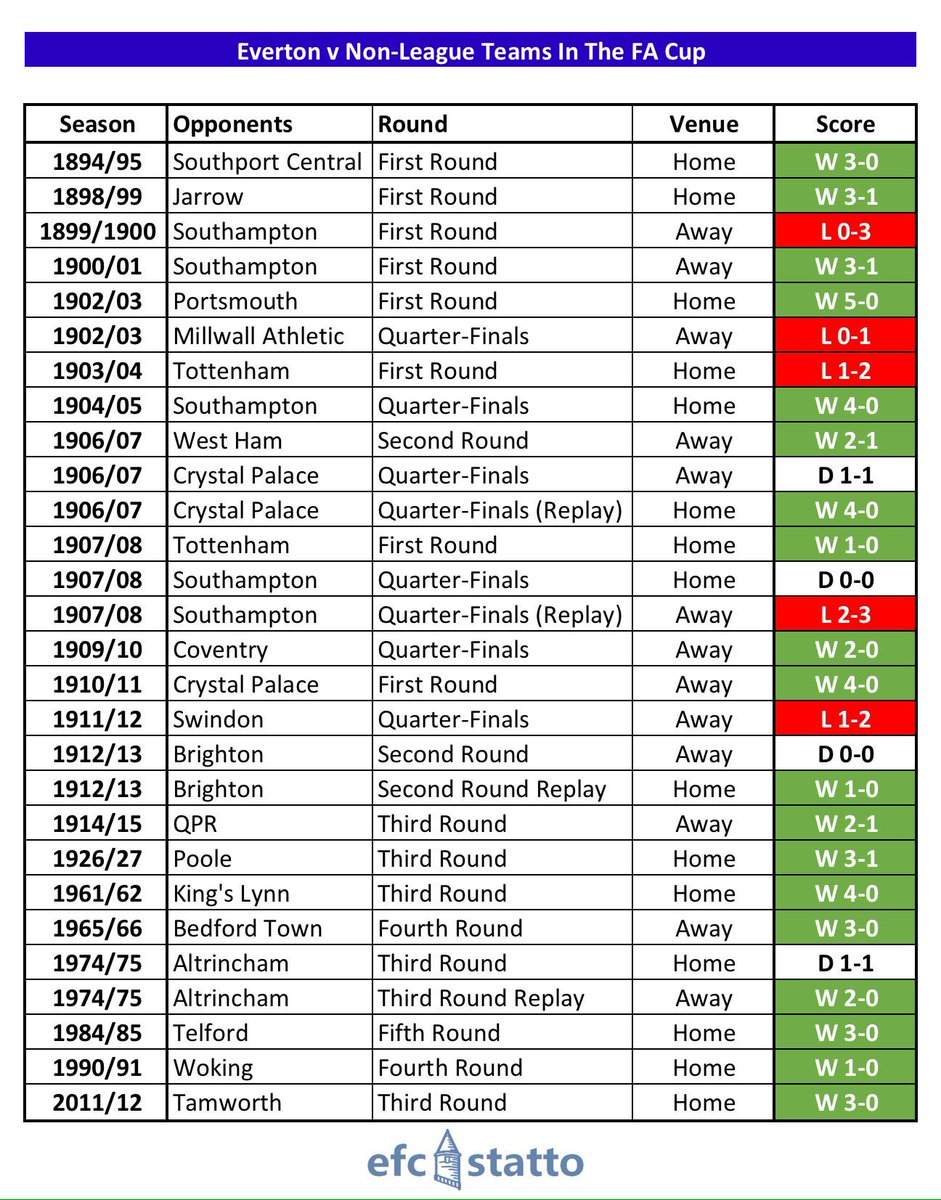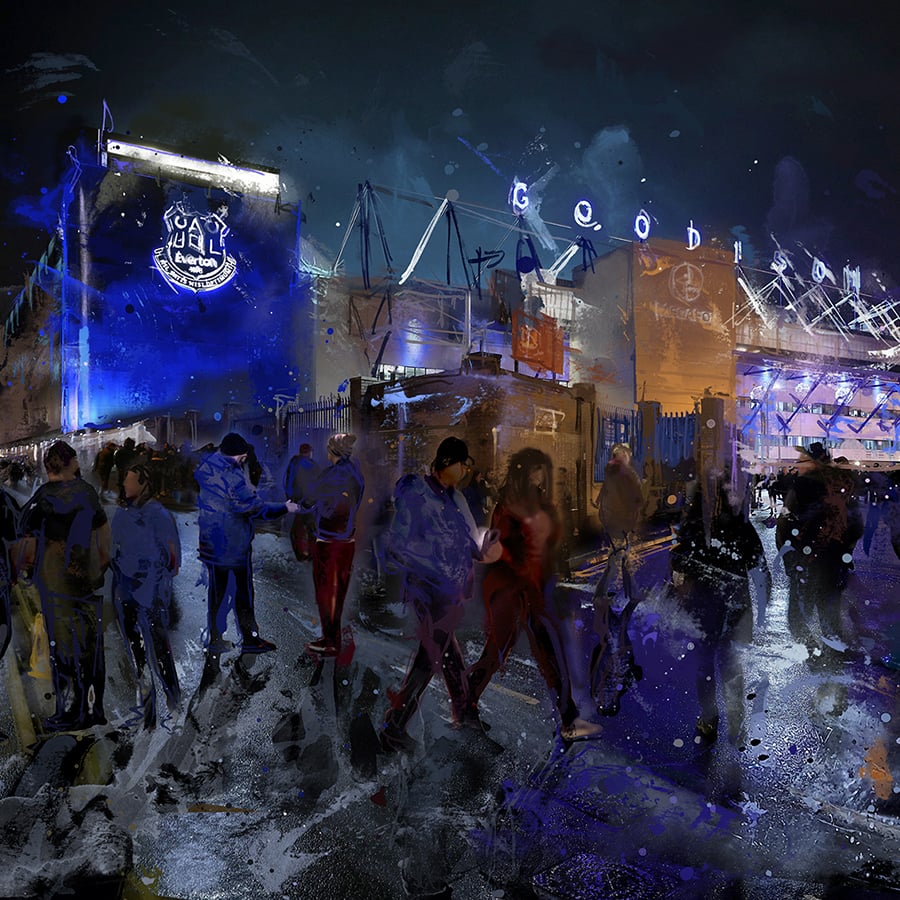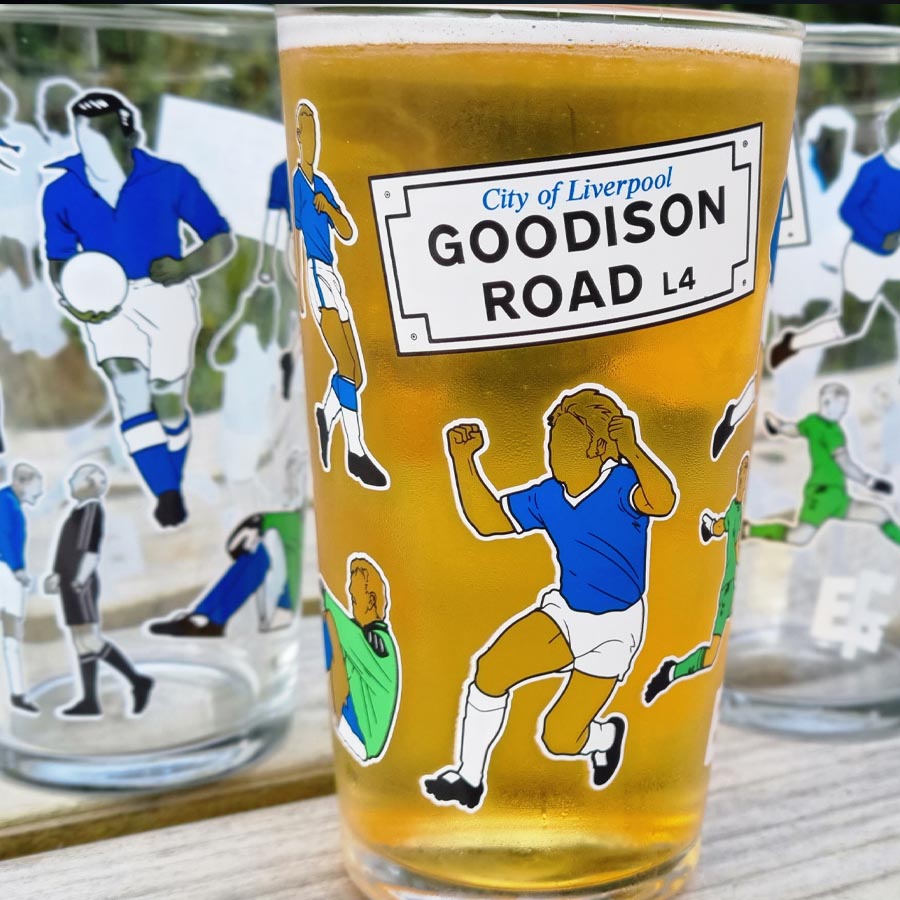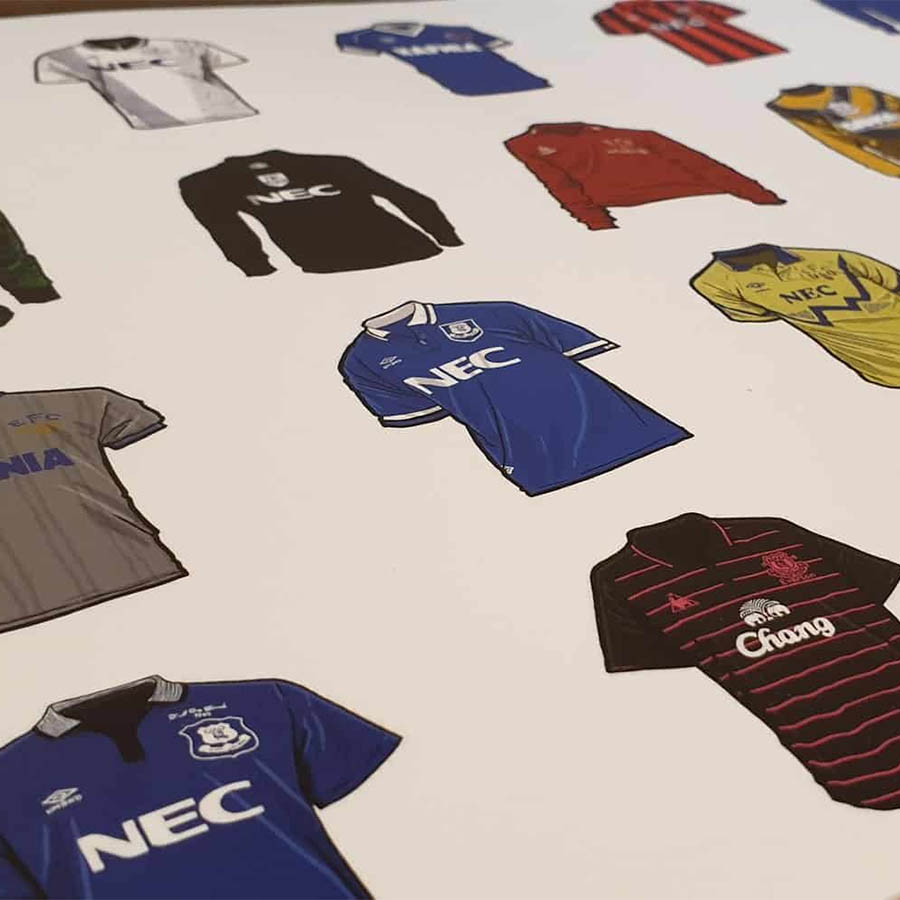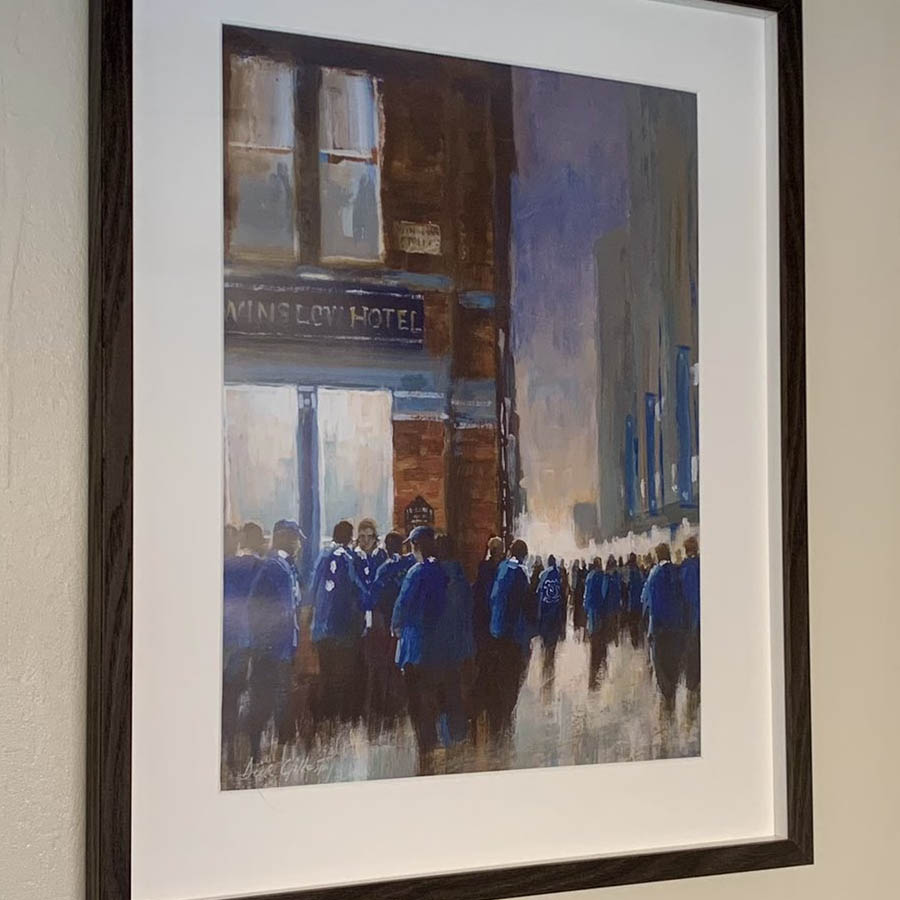summerisle
The rain, it raineth every day
Any snippets of old Everton history please post here. Here's an Echo article from 1889 giving information on our first season in 1888, as well as vignettes of the first League team. Acidly written compared nowadays to the anodyne rubbish passed off as comment.
https://playupliverpool.com/1889/11/16/the-everton-heroes/
Saturday, November 16 – 1889
During the past few years, the Association football has made giant strides, in Liverpool and district, as witness the existence and prosperity of such teams as those disporting themselves before thousands of spectators, week by week, at Everton and Bootle; also somewhat minor clubs of good standing, as the Stanley, Bootle Athletic, and a dozen teams, all capable of giving a fairly scientific exposition of the game.
Ten years ago, a good game of Association football was not to be seen in the neighbourhood, the field being almost entirely held by the Rugby Union men. But each year the circular ball had continued to assert a rivalry with the oval, till now the two clubs first named are the means of drawing more spectators than all the Rugby matches put together. And their comparative standing, too, is far ahead of the local Rugby clubs; for New Brighton, Birkenhead Park, Liverpool, or the Old Boys all occupy much lower positions in the world of Rugby football than do the Everton in the Association community.
The Everton men can give the best teams in the three countries a good game; while the local Rugby fifteens make but a sorry show against such a team as the Fetter Loretto men, West of Scotland, Bradford, and the local champions hailing from balmy Runcorn. Then, in the matter of gates, Everton stands at the top of the list, there being very few clubs in the British Isles showing a weekly average equal to the register of their takings.
Yet it is only nine years since the club was formed, their first ground being a public one, in Stanley Park, where of course, the great desideration of every Association club –“gates” to wit – could not be obtained. For several years the club’s existence was not conspicuous for any remarkable feats, all the players being local and purely amateur ones, both of which qualifications have now been done away with.
Of which more anon. After four years’ play, the public interested in such matters aroused to the fact that Everton might be made famous for other things than toffee, and the supremacy of that toothsome dainty as the particular and peculiar characteristic of the place was at the last threatened, The “King of Everton” – who as all the world knows, is Mr. John Houlding –consulted with his liege subjects, and the result was the acquisition of a piece of land near Stanley Park, Mr. Houlding generously financing the transaction.
With the modesty of greatness, the committee at first erected a couple of small stands for the accommodation of spectators, and until the end of 1887 these sufficed. At the beginning of last season, however, it was found absolutely necessary to increase the accommodation, which was done, at the an expenditure of £1,500 with the result that Everton ground is now as comfortable and as well fitted as any in the kingdom. At each side are large covered stands, behind each goal are other stands, holding nearly 4,000 each, and taking all the stands together, about 12,000 people have a good view of the game from them; while another 6,000 have the same from standing room on the ground. Notwithstanding this, the spectators at times are almost inconveniently crowded, and gates of nearly 20,000 are not altogether unknown. The total receipts last year were £4,500; but of the sum at least £45 was expended every week for paying the professional players.
There were, however, circumstances, which will hardly occur again, necessitating this large outlay. Several professionals who were engaged at the beginning of the season did not realise the expectations formed of them, and others had to be looked for, so that the committee were compelled to pay for men whom they did not require. Owing to their lengthily gold-bags, the Everton Club can offer to good professionals exceptionally favourable terms, and of course the Land of cakes, being the home of the Association game, has had to part with several fine players, who show an inclination of going “back again.”
Among them are a couple of Scottish Internationals – Andrew Hannah, the captain, and Alex Latta. Although Liverpudlians and especially Evertonian folk, are proud of their club, it is to be regretted that there is not a single home-grown player in the team, as this is surely a sad indication that the district cannot raise a man of really first-class form.
It will doubtless be of interest to-day if we give a brief sketch of the football career run by the Everton team. Individually as it was constituted a few weeks ago; but doubtless one or two alterations have been made, James Weir for instance, not turning out of late, owing to injuries received.
Beginning at the goal we take Robert Smalley who frequently known as Bob Smalley. Bob is a professional of the game, who’s place on the field is under the cross-bar, where he has achieved no little fame. He is 5ft 8in, in height, and his kicking weight is 10st 10lbs. Robert is a Lancashire lad, and first saw the light in 1866 in the town of Darwen, after which the family removed to Preston. There Bob joined the North End, and for the reserve team he made his appearance as left wing forward. During a match he was roughly handled and subsequently to this he was allocated the post of goalkeeper, and in that defensive position, he has remained, repelling hot shots, fisting out shots. He has played for the Everton now for two years.
Then come the two full backs, of whom Andrew Hannah (Captain). Andrew is his front name, and Scotland is his nation, for he was born in Renton, Dunbartonshire on September 17, 1864. He stands 5fy 7ins, with his coat off, and kicks the beam – not to mention the ball –at 11 and half stone. When sixteen years of age, Andy betook himself to jumping, an exercise in which he speedily attained and rivalling of springheel Jack. He attended all the games, as athletic sports are termed across the border and won many prizes, both in running and jumping contests, and truly he made a good thing out of his speed and spring.
The Renton Wanderers soon enrolled him in their ranks, and as full back he played with both sill and in judgement. Soon after the Renton club took him, and Hannah becoming a member rapidly worked himself into the front rank of footballists. He was chosen to represent his county against Glasgow, and later on he played full back against Lancashire, and he afterwards represented his country against Wales in 1887, and last season his services were wanted by the Everton Club, with the result that at the beginning of the present season he was installed as captain. Hannah is not only a fine player, but he makes a good captain.
The other back is, Dan Doyle , the biggest man in the team, standing an inch and a half under six feet, and weighting 13 and half stone. Danny is not such a broth of a boy as his name might imply, for it was in Paisley he was born, over twenty-three years ago. Doyle’s weights has served him in good stead during the eight years he has figured on the fields of various clubs, his first love being the Airdrie Club, which he added for four years than playing a season with Broxburn, and afterwards with the Edinburgh Hibernians.
In 1888, at the beginning of the season he went to Grimsby, leaving that club for the Bolton Wanderers before the season closed. With the Wanderers he did great things being on the ball when they beat the proud Preston by 5 goals to one. In May of this year Doyle broke the proverb by going back to Scotland, but he once more said farewell to Auld Reakie and the Gralasmarket, and joined himself unto the Everton club. Both as a defensive and an aggressive player Doyle is a valuable man, and plays with equal football on either side.
The right half-back at present, is Charles Parry , who has seen but nineteen summers, or perhaps in the case of a football player we should say winters. At any rate, he is nineteen years of age, 5ft 8 in, in height, and weights 12st, 2lb when in good conditions. He is a robustly built young fellow, and has been extremely useful to the team, first as a forward, and more recently – since Weir was hurt at Wolverhampton – at half-back.
Parry’s first exploits in the football field were on behalf of a small football club in Oswestry, subsequently casting in his lot with the Chester St. Oswald’s with whom he played as centre forward till last season was well on the wane, when he joined Everton.
The left back is George Farmer, who was born in Oswestry twenty-six years ago, weights 11st , and stands barely 5ft 6in. Geordie is a great favourite with the Everton people, before whom he has been for a long time, being almost a Liverpudlian by right of his seven years’ residence here. Taking into account the tender age of the game he may be fairly called a genuine Liverpool player.
The gentleman who does the sketches for the Football Echo has rather failed to catch Geordie’s charming smile, but for this he has nobly attempted to compensate by giving a fine moustache. Farmer and his smile appeared first to support the fortunes of the Oswestry eleven, and by his qualification there be thrice donned jersey for Wales, look you, as left wing forward. He has played several times for Lancashire, and no district team of Liverpool is complete without him. As a forward he played a dashing game, being as full of tricks as a Waterbury watch, but he has now settled down at half back, where his defensive tackling finds full scope.
Johnny Holt , the centre half back, who is twenty-one, weights 10st, prompt, and is 5ft 4 and half inches, high so that he is not a large man. John Holt began his football career at the age of fifteen, with the Kings’ Own F.C., but he ultimately joined the Church Club, and there were soon marked as a fine player. Four years since he came to Liverpool, playing with the Bootle Club for two years, but last season he came to Everton, being a very great acquisition to the club. Holt is without doubt one of the best half-backs in England, his tackling capabilities being what the old Dominie, termed “Prodigious!” Last Year he played for Lancashire against East of Scotland, the country winning by seven goals to one. Last year he narrowly escaped becoming an international, being chosen as a reserve against Scotland.
Probably one of the greatest favourites with the Everton crowds is Fred Geary who is but a slender youth, weighting 9 stone, and being 5ft 7ins, above the level of the sea, so to speak, as it were, or words to that effect. Geary is a Nottinghamtonian – that’s a good word –and first saw the light in the Lace City on January 23, 1867.
A few years after this auspicious date he joined the Bothwell Rangers, playing both well and hard. He continued but one season with the Rangers, and then got on the books of the Basford Rovers, whom, however, he did not serve long, going to the Notts Rangers, with which club he played for three years. Inducements of a pleasant character were instrumental in securing his presence in the ranks of Everton.
He was in Liverpool soon after the close of last season, and during the Athletic term he went in for amateur sprinting, in which field he carried off three firsts, two seconds, and ditto of thirds –not at all a bad record for toeing the mark nine times only. He subsequently ran as a professional, and in August last he won a £20 handicap in a most easy fashion, although he was a rank outsider in the opinion of the knowing “bookies.”
Geary’s great speed, his lightness of foot, and his agility are eminently useful qualities, and it is a sight to him scouring down the field with the ball at his toe, puraned by hopeful but leaden-footed opponents. The estimation in which the speedy forward is held may be gauged to some extent by the result of a competition recently organised by an athletic paper, Geary being voted the best forward in England. Although that is a matter for discussion, there can be no doubt he is one of the best centre forwards in the country.
Alex Latta, outside wing forward, is twenty-two years of age, he weighs 12 stone, and stands 5ft 8in, in his socks. Since 1884 he played for Dumbarton Athletic, of which club he was as original member. He was chosen in his county team eight times, and he further represented Scotland against England in the matches last season, and against Wales the previous season. Latta is a new acquisition so Everton this year, his play being of that well-judged nature which so strengthen any team. He is a really fine all-round player, and his large experience against first-class clubs is of much use to him. He has won about a dozen medals in football contests, the majority being gold trophies.
Alex Brady . Is another son of Caledonia. He is nineteen years of age, 5ft 5 and half in, high, and weighs 10 stone. He is fairly fast, very tricky, and has a wonderful control over the ball, which he can twist. Curl, and break in a manner the most surprising. His forward play is very good, his training being the Renton star and Renton Thistle Clubs. Last year he went to Sunderland in which club he played as an amateur, and subsequently he figured with the Burnley team. Later he returned to Glasgow, but was given a call by the Everton Club, with whom he hopes to remain.
Edgar Chadwick is a Blackburn lad of twenty years, weights 10st, sharp and his front elevation is 5 and half feet. His first experience of the game with a club called the “ Little Dots,” which qualified him for a place in the Blackburn Olympic Reserves. His play in the team was so good that room in the first eleven was made, and Chadwick soon justified the action of the committee so that the Blackburn Rovers annexed him for a season, and last year he joined Everton. Edgar is a fine all round footballists, being a good shot, an excellent kick in any position, leaving one foot free, and his capabilities are available as half-back, or forward-a most useful man for the best team.
James Weir was a fine half-back for the club, but he got hurt some weeks ago. Although he is not yet playing again.
Bob Cain , who played with the Airdrie Club till lately, has now joined the Everton, and plays at half, vice Farmer, who has not altogether please the committee of late.
Alf Milward, who plays for the first team this season, is a capital forward, although one of the youngest members of the team. He formerly played in the London district, where he earned for himself a reputation, which his play here has already enhanced.
(Liverpool Echo, 16-11-1889)
Lots of other articles here.
https://playupliverpool.com/?s=Everton
https://playupliverpool.com/1889/11/16/the-everton-heroes/
Saturday, November 16 – 1889
During the past few years, the Association football has made giant strides, in Liverpool and district, as witness the existence and prosperity of such teams as those disporting themselves before thousands of spectators, week by week, at Everton and Bootle; also somewhat minor clubs of good standing, as the Stanley, Bootle Athletic, and a dozen teams, all capable of giving a fairly scientific exposition of the game.
Ten years ago, a good game of Association football was not to be seen in the neighbourhood, the field being almost entirely held by the Rugby Union men. But each year the circular ball had continued to assert a rivalry with the oval, till now the two clubs first named are the means of drawing more spectators than all the Rugby matches put together. And their comparative standing, too, is far ahead of the local Rugby clubs; for New Brighton, Birkenhead Park, Liverpool, or the Old Boys all occupy much lower positions in the world of Rugby football than do the Everton in the Association community.
The Everton men can give the best teams in the three countries a good game; while the local Rugby fifteens make but a sorry show against such a team as the Fetter Loretto men, West of Scotland, Bradford, and the local champions hailing from balmy Runcorn. Then, in the matter of gates, Everton stands at the top of the list, there being very few clubs in the British Isles showing a weekly average equal to the register of their takings.
Yet it is only nine years since the club was formed, their first ground being a public one, in Stanley Park, where of course, the great desideration of every Association club –“gates” to wit – could not be obtained. For several years the club’s existence was not conspicuous for any remarkable feats, all the players being local and purely amateur ones, both of which qualifications have now been done away with.
Of which more anon. After four years’ play, the public interested in such matters aroused to the fact that Everton might be made famous for other things than toffee, and the supremacy of that toothsome dainty as the particular and peculiar characteristic of the place was at the last threatened, The “King of Everton” – who as all the world knows, is Mr. John Houlding –consulted with his liege subjects, and the result was the acquisition of a piece of land near Stanley Park, Mr. Houlding generously financing the transaction.
With the modesty of greatness, the committee at first erected a couple of small stands for the accommodation of spectators, and until the end of 1887 these sufficed. At the beginning of last season, however, it was found absolutely necessary to increase the accommodation, which was done, at the an expenditure of £1,500 with the result that Everton ground is now as comfortable and as well fitted as any in the kingdom. At each side are large covered stands, behind each goal are other stands, holding nearly 4,000 each, and taking all the stands together, about 12,000 people have a good view of the game from them; while another 6,000 have the same from standing room on the ground. Notwithstanding this, the spectators at times are almost inconveniently crowded, and gates of nearly 20,000 are not altogether unknown. The total receipts last year were £4,500; but of the sum at least £45 was expended every week for paying the professional players.
There were, however, circumstances, which will hardly occur again, necessitating this large outlay. Several professionals who were engaged at the beginning of the season did not realise the expectations formed of them, and others had to be looked for, so that the committee were compelled to pay for men whom they did not require. Owing to their lengthily gold-bags, the Everton Club can offer to good professionals exceptionally favourable terms, and of course the Land of cakes, being the home of the Association game, has had to part with several fine players, who show an inclination of going “back again.”
Among them are a couple of Scottish Internationals – Andrew Hannah, the captain, and Alex Latta. Although Liverpudlians and especially Evertonian folk, are proud of their club, it is to be regretted that there is not a single home-grown player in the team, as this is surely a sad indication that the district cannot raise a man of really first-class form.
It will doubtless be of interest to-day if we give a brief sketch of the football career run by the Everton team. Individually as it was constituted a few weeks ago; but doubtless one or two alterations have been made, James Weir for instance, not turning out of late, owing to injuries received.
Beginning at the goal we take Robert Smalley who frequently known as Bob Smalley. Bob is a professional of the game, who’s place on the field is under the cross-bar, where he has achieved no little fame. He is 5ft 8in, in height, and his kicking weight is 10st 10lbs. Robert is a Lancashire lad, and first saw the light in 1866 in the town of Darwen, after which the family removed to Preston. There Bob joined the North End, and for the reserve team he made his appearance as left wing forward. During a match he was roughly handled and subsequently to this he was allocated the post of goalkeeper, and in that defensive position, he has remained, repelling hot shots, fisting out shots. He has played for the Everton now for two years.
Then come the two full backs, of whom Andrew Hannah (Captain). Andrew is his front name, and Scotland is his nation, for he was born in Renton, Dunbartonshire on September 17, 1864. He stands 5fy 7ins, with his coat off, and kicks the beam – not to mention the ball –at 11 and half stone. When sixteen years of age, Andy betook himself to jumping, an exercise in which he speedily attained and rivalling of springheel Jack. He attended all the games, as athletic sports are termed across the border and won many prizes, both in running and jumping contests, and truly he made a good thing out of his speed and spring.
The Renton Wanderers soon enrolled him in their ranks, and as full back he played with both sill and in judgement. Soon after the Renton club took him, and Hannah becoming a member rapidly worked himself into the front rank of footballists. He was chosen to represent his county against Glasgow, and later on he played full back against Lancashire, and he afterwards represented his country against Wales in 1887, and last season his services were wanted by the Everton Club, with the result that at the beginning of the present season he was installed as captain. Hannah is not only a fine player, but he makes a good captain.
The other back is, Dan Doyle , the biggest man in the team, standing an inch and a half under six feet, and weighting 13 and half stone. Danny is not such a broth of a boy as his name might imply, for it was in Paisley he was born, over twenty-three years ago. Doyle’s weights has served him in good stead during the eight years he has figured on the fields of various clubs, his first love being the Airdrie Club, which he added for four years than playing a season with Broxburn, and afterwards with the Edinburgh Hibernians.
In 1888, at the beginning of the season he went to Grimsby, leaving that club for the Bolton Wanderers before the season closed. With the Wanderers he did great things being on the ball when they beat the proud Preston by 5 goals to one. In May of this year Doyle broke the proverb by going back to Scotland, but he once more said farewell to Auld Reakie and the Gralasmarket, and joined himself unto the Everton club. Both as a defensive and an aggressive player Doyle is a valuable man, and plays with equal football on either side.
The right half-back at present, is Charles Parry , who has seen but nineteen summers, or perhaps in the case of a football player we should say winters. At any rate, he is nineteen years of age, 5ft 8 in, in height, and weights 12st, 2lb when in good conditions. He is a robustly built young fellow, and has been extremely useful to the team, first as a forward, and more recently – since Weir was hurt at Wolverhampton – at half-back.
Parry’s first exploits in the football field were on behalf of a small football club in Oswestry, subsequently casting in his lot with the Chester St. Oswald’s with whom he played as centre forward till last season was well on the wane, when he joined Everton.
The left back is George Farmer, who was born in Oswestry twenty-six years ago, weights 11st , and stands barely 5ft 6in. Geordie is a great favourite with the Everton people, before whom he has been for a long time, being almost a Liverpudlian by right of his seven years’ residence here. Taking into account the tender age of the game he may be fairly called a genuine Liverpool player.
The gentleman who does the sketches for the Football Echo has rather failed to catch Geordie’s charming smile, but for this he has nobly attempted to compensate by giving a fine moustache. Farmer and his smile appeared first to support the fortunes of the Oswestry eleven, and by his qualification there be thrice donned jersey for Wales, look you, as left wing forward. He has played several times for Lancashire, and no district team of Liverpool is complete without him. As a forward he played a dashing game, being as full of tricks as a Waterbury watch, but he has now settled down at half back, where his defensive tackling finds full scope.
Johnny Holt , the centre half back, who is twenty-one, weights 10st, prompt, and is 5ft 4 and half inches, high so that he is not a large man. John Holt began his football career at the age of fifteen, with the Kings’ Own F.C., but he ultimately joined the Church Club, and there were soon marked as a fine player. Four years since he came to Liverpool, playing with the Bootle Club for two years, but last season he came to Everton, being a very great acquisition to the club. Holt is without doubt one of the best half-backs in England, his tackling capabilities being what the old Dominie, termed “Prodigious!” Last Year he played for Lancashire against East of Scotland, the country winning by seven goals to one. Last year he narrowly escaped becoming an international, being chosen as a reserve against Scotland.
Probably one of the greatest favourites with the Everton crowds is Fred Geary who is but a slender youth, weighting 9 stone, and being 5ft 7ins, above the level of the sea, so to speak, as it were, or words to that effect. Geary is a Nottinghamtonian – that’s a good word –and first saw the light in the Lace City on January 23, 1867.
A few years after this auspicious date he joined the Bothwell Rangers, playing both well and hard. He continued but one season with the Rangers, and then got on the books of the Basford Rovers, whom, however, he did not serve long, going to the Notts Rangers, with which club he played for three years. Inducements of a pleasant character were instrumental in securing his presence in the ranks of Everton.
He was in Liverpool soon after the close of last season, and during the Athletic term he went in for amateur sprinting, in which field he carried off three firsts, two seconds, and ditto of thirds –not at all a bad record for toeing the mark nine times only. He subsequently ran as a professional, and in August last he won a £20 handicap in a most easy fashion, although he was a rank outsider in the opinion of the knowing “bookies.”
Geary’s great speed, his lightness of foot, and his agility are eminently useful qualities, and it is a sight to him scouring down the field with the ball at his toe, puraned by hopeful but leaden-footed opponents. The estimation in which the speedy forward is held may be gauged to some extent by the result of a competition recently organised by an athletic paper, Geary being voted the best forward in England. Although that is a matter for discussion, there can be no doubt he is one of the best centre forwards in the country.
Alex Latta, outside wing forward, is twenty-two years of age, he weighs 12 stone, and stands 5ft 8in, in his socks. Since 1884 he played for Dumbarton Athletic, of which club he was as original member. He was chosen in his county team eight times, and he further represented Scotland against England in the matches last season, and against Wales the previous season. Latta is a new acquisition so Everton this year, his play being of that well-judged nature which so strengthen any team. He is a really fine all-round player, and his large experience against first-class clubs is of much use to him. He has won about a dozen medals in football contests, the majority being gold trophies.
Alex Brady . Is another son of Caledonia. He is nineteen years of age, 5ft 5 and half in, high, and weighs 10 stone. He is fairly fast, very tricky, and has a wonderful control over the ball, which he can twist. Curl, and break in a manner the most surprising. His forward play is very good, his training being the Renton star and Renton Thistle Clubs. Last year he went to Sunderland in which club he played as an amateur, and subsequently he figured with the Burnley team. Later he returned to Glasgow, but was given a call by the Everton Club, with whom he hopes to remain.
Edgar Chadwick is a Blackburn lad of twenty years, weights 10st, sharp and his front elevation is 5 and half feet. His first experience of the game with a club called the “ Little Dots,” which qualified him for a place in the Blackburn Olympic Reserves. His play in the team was so good that room in the first eleven was made, and Chadwick soon justified the action of the committee so that the Blackburn Rovers annexed him for a season, and last year he joined Everton. Edgar is a fine all round footballists, being a good shot, an excellent kick in any position, leaving one foot free, and his capabilities are available as half-back, or forward-a most useful man for the best team.
James Weir was a fine half-back for the club, but he got hurt some weeks ago. Although he is not yet playing again.
Bob Cain , who played with the Airdrie Club till lately, has now joined the Everton, and plays at half, vice Farmer, who has not altogether please the committee of late.
Alf Milward, who plays for the first team this season, is a capital forward, although one of the youngest members of the team. He formerly played in the London district, where he earned for himself a reputation, which his play here has already enhanced.
(Liverpool Echo, 16-11-1889)
Lots of other articles here.
https://playupliverpool.com/?s=Everton

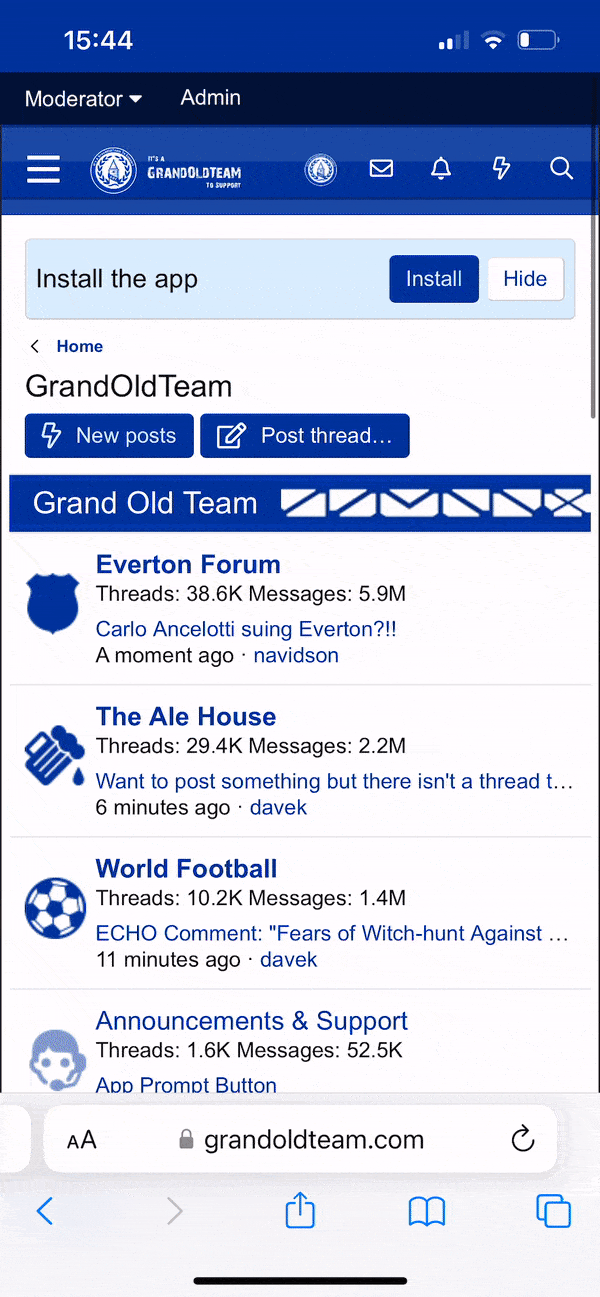
 very interesting read thoe
very interesting read thoe
